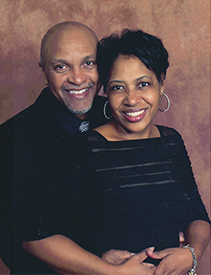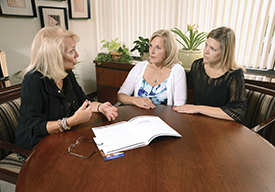By ELLEN FUTTERMAN
As a pastor and social worker, Reggie Huff has witnessed his share of arguments about end-of-life decisions that tore entire families apart.
"I would be in the hospital room with relatives while their loved one was dying, and they wouldn't be able to speak to one another," said Huff, 63, of Detroit, whose nondenominational congregation numbers about 100 members. "The doctor would be saying the patient is near the end of life, but family members couldn't agree on a course of action. They were trying to make important, life-and-death decisions based on emotion because they didn't know what their family member, who could no longer speak, wanted to do."

Reggie and Linda Huff
Huff and his wife, Linda, 55, decided to be proactive and talk about their wishes for end-of-life care before either of them suffered a health crisis or were diagnosed with a serious illness. Once they figured out what they wanted, they sat down and shared their decisions with their four grown children. Then they each wrote down their plan in an advance care directive.
The Huffs' thoughtful process is one that Drew Weil hopes will be replicated across the greater Detroit area. Weil coordinates an ambitious advance care planning initiative at St. John Providence Health System in Warren, Mich. "An advance directive is an outcome of the bigger process of advance care planning, which entails thinking about your health care values and preferences, figuring out who you want to make medical treatment decisions for you if you cannot do so yourself, documenting those decisions and then sharing your plan so that it shouldn't come as a surprise to your family," he said.
Call to action
About a year ago, the leadership at St. John Providence decided to ramp up awareness about advance care planning through education and outreach among its own employees, community doctors and parish nurses who can spread the word.
Thirty of the health system's social workers, nurses and palliative care specialists, including Weil, have undergone special training to become certified facilitators of advance care planning; more will be trained in the coming months.
The facilitators talk to patients in St. John Providence hospitals and in doctors' offices about the benefits of advance care planning. "Initially, when we did our needs assessment, we found that only 16 percent of the patients in all six (St. John Providence) hospitals had completed an advance directive," said Weil. "Since we have made this concerted push, more than 400 patients, or roughly two out of three patients who have been approached by a facilitator, have indicated they are interested in an advance care plan," he added.
"We are trying to give community members better access to people who are knowledgeable about ACP and its process," Weil said. "It's been proven that when people are able to make informed medical decisions, they often choose less aggressive end-of-life treatment options than they would normally. This should tell us something — people are forced to make (medical) decisions that they don't understand. Part of our program also includes educating patients about treatment options, encouraging them to better understand their current state of health, and aligning the treatments they receive with their personal health care goals and preferences."
St. John Providence has provided advance care planning "starter kits" with brochures, a poster and an educational video to more than 300 doctors in over 100 physician practices. "We wanted to target the physician offices since the goal is to promote these conversations to be proactive and take place outside of the hospital, when it is not an emergency situation," Weil explained.
Model providers
St. John Providence also is promoting the benefits of advance care planning among its 17,000 employees. Its facilitators have held lunch-and-learns and other forums to educate hospital executives, board members and staff.

St. John Providence Health System has trained 30 social workers, palliative care specialists and nurses like Patti Koval, left, to facilitate detailed discussions of advance care plans. Here Koval has the first of what is expected to be several conversations with Patricia McKeown, center, and McKeown's daughter Danielle Barbes. McKeown is writing an advance care plan while she is in good health.
Weil said turnout at the informational gatherings has been "great," and more than 2,000 associates and several hundred community members have heard live presentations or viewed the video on advance care planning since the initiative launched in November.
Weil is fine-tuning two advance care planning education modules that he expects to go live on the health system's online learning institute this fall. A one-hour web course intended for all St. John Providence employees provides a broad introduction to advance care planning. A four-hour course that includes web-based modules and coaching is designed to prepare clinicians to talk about advance care planning with patients.
Weil is leaving St. John Providence this month to begin a Master of Public Health program at Yale University in New Haven, Conn. He said that Liz DiStefano, the health system's palliative care coordinator, will ensure continuity of the advance care planning initiative.
A living document
Brian Bunte is a care coordinator for St. John Providence Partners In Care, a physician hospital organization and accountable care organization. He meets with chronically ill patients who are at high risk for relapse when they are discharged from the hospital and follows up with them by phone once they are home. One of the things he now makes sure to ask is if they have an advance directive.
"Most of the time they do not, but once I explain about it, they are interested in learning more," said Bunte, who also has been trained as an advance care facilitator. "I want them to know they can direct their health care and that I am here to help them do just that."
Lynn Bidigare is a veteran social worker at St. John Providence who also is a lawyer with a private practice specializing in estate planning, family law and end-of-life planning for the terminally ill. She said advance directives aren't anything new; they've been available for 20 years or so. "But the community had little interest in the documents overall partially because these conversations about end-of-life are not natural or easy," she said.
As a trained advance care planning facilitator, Bidigare uses open-ended questions to explore the person's wishes for end-of-life care. "Part of our training is to help a person think through all sorts of scenarios without being judgmental or steering the conversation in any one direction," she said.
The facilitators said one of the bigger challenges is getting people to understand they shouldn't wait until they are old, or sick, to make an advance care plan.
"Ideally, a person should have an advance directive at age 18," said Weil. "They are living documents that should be updated as circumstances change, such as the death of a loved one, a marriage or a divorce, diagnosis of an illness or decline in health."
Weil said that in most cases, a lawyer isn't necessary to draw up an advance directive or a durable power of attorney for health care, a document that gives someone the legal authority to make health care decisions in the event a person can no longer do so for him or herself.
The Huffs prepared their advance care directives before St. John Providence launched its educational initiative, and they appear in the hospital's unscripted video. Weil said the video "normalizes" the idea of starting a conversation about end-of-life care planning.
Linda Huff, a parish nurse and an administrator in a human services organization in Detroit, said she worked in patient relations for 15 years and saw firsthand how families struggled with end-of-life decisions. "I was set against my children having to do that. I wanted them to know what I wanted so they didn't have to second-guess themselves again and again."
Said Weil: "I'm 24 years old, and I have an advance directive because I understand how important it is. We need to 'walk the talk,' lead by example, and encourage all health care workers to develop their own advance care plan."
|
Web resources for advance care planning
Talking about end-of-life care isn't necessarily an easy conversation to have, but it's most definitely a vital one. Drew Weil, project manager of an advance care planning initiative at St. John Providence Health System, notes that in a culture that anticipates everything from breakfast menus to a night's television line-up, people often neglect to plan ahead where it might really matter: a situation where they are ill and incapable of speaking for themselves.
A recent study by The Conversation Project, a nonprofit dedicated to helping people talk about their wishes for end-of-life care, found that 90 percent of Americans know they should have a conversation about their health care wishes, yet only 30 percent have done so. As a result, life-and-death decisions are often left to family members or doctors who may not know what the patient wants.
Some websites that provide useful information on this subject include:
St. John Providence Health System: As part of its push to encourage healthy people and patients to complete advance care plans, the system publishes tips and tools for advance care planning at stjohnprovidence.org/AdvanceDirective.
CHA: The association's booklet "Advance directives: A guide to help you express your health care wishes" can be downloaded online.
Supportive Care Coalition: Advancing Excellence in Palliative Care: This group's website, supportivecarecoalition.org, includes links to dozens of resources on advance care planning, palliative care and end-of-life care.
The Conversation Project: Cofounded by Pulitzer Prize winning journalist Ellen Goodman, the Conversation Project offers "a starter kit" of tools, guidance and resources to encourage people to begin talking to loved ones, in an informal setting, about their wishes and preferences for end-of-life health care and treatment. For more information, go to theconversationproject.org.
Caring Connections: This program of the National Hospice and Palliative Care Organization offers free resources and information to help people make decisions about end-of-life care and services before a crisis. Among the resources it offers are state-specific advance directives.
Centers for Disease Control and Prevention: The CDC compiles a broad array of materials to assist the public in better understanding advance care planning and related topics such as hospice and palliative care, caregiving, cognitive impairment, and legal issues on its website.
|
|
Raising awareness by design
St. John Providence Health System of Warren, Mich., created a multifaceted initiative called MY PLAN, which stands for Making Your Personal Life Wishes: Act Now to spread the word about the importance of advance care planning. The campaign's four major prongs so far include:
Communication tools — These include brochures, posters, advance directive forms and a video on advance care planning. These resources are bundled in a "starter kit" that has been delivered to more than 100 of the health system's partner physician offices, six acute care sites and the home care and hospice staff office.
Web-based training — Modules expected to launch on the health system's intranet this fall will target St. John Providence's 17,000 employees at six hospitals and more than 125 medical facilities in southeast Michigan.
Electronic medical records —Within six months the health system plans to incorporate advance care plans into the health system's electronic medical records system for easy access from multiple locations.
Promote action — The campaign will foster a culture in which advance care planning is routine.
|
Copyright © 2014 by the Catholic Health Association
of the United States
For reprint permission, contact Betty Crosby
or call (314) 253-3477.